The Origins of Natural Stone
Natural stone can be categorized in three ways: Igneous, Sedimentary, and Metamorphic. Igneous rocks are the result of magma or lava solidifying and cooling, either beneath the earth’s surface or ejected from volcanoes and left to cool above-ground. Granite is the most common form of igneous stone but other kinds include basalt, dunite, rhyolite, and gabbro. Sedimentary rocks form through a combination of fragments from other rocks, along with the remains of plants, animals, and other organic materials. These materials accumulate in deserts, oceans, and lakes before they are compressed into their final form by the weight of the earth above them. Limestone is the most common sedimentary rock with siltstone, dolomite, and shale comprising other variations.

Extracting Natural Stone
After nature takes care of the first step in actually forming the stone, the next step of removing and re-purposing the stone for use is done by human hands at stone quarries all over the world. The process of quarrying stone is extensive and requires powerful machinery along with skilled quarry workers. Before the stone can even be touched, there is a long list of actions that need to take place. Firstly, a team of geologists must find stone outcrops at a quarry that can be examined. Next, a sample of the stone is taken by drilling into the rock with diamond-tipped drill bits. The sample is then analyzed to discover if it has the desired characteristics to be used as a building material.
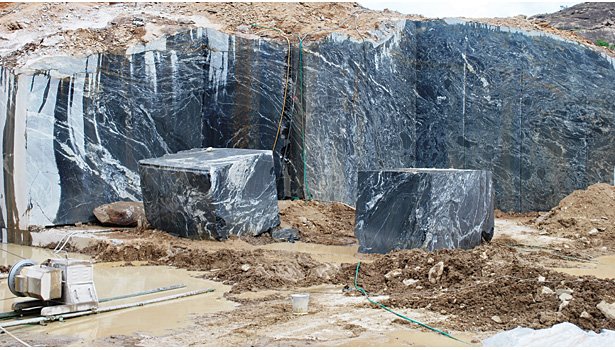
Processing Natural Stone
At the processing facility, the stone blocks are then cut into slabs by high-speed gang saws that also release water while cutting to reduce the emission of dust. Despite the speed at which they operate, the gang saws typically take around two days to finish cutting a 20-ton block of stone. Next, the slabs are sent through a polishing machine to give the desired finish. Polished is the most common finish with honed, leathered, and brushed being other options that provide different degrees of texture on the surface of the stone.

Browsing the Gallery
We have some of the largest natural stone showrooms in Kishangarh and so it can be quite overwhelming to know where to start. For this reason, it is recommended that you first make some initial choices when it comes to the kind of material you are looking for.

Making Your Selection
To ensure you make the best decision when it comes to the slabs you want to have installed in your home, you will need to be able to compare them with the colors of your other design elements, such as cabinets and flooring. If you have a sample of those elements with you when you visit, that is ideal. If not, color swatches can also do the trick to hold up to the slabs and ensure the colors either blend together or contrast in a pleasing way.

Enjoying Your Countertops
Once your countertops are installed, there is one more step to take before you can fully enjoy them and that is to seal the stone. A sealer will reduce the likelihood of scratches, stains, and etching and will give you some peace of mind so you can relax and admire your beautiful stone countertops, in addition to putting them to good use.

Advantages of Countertops
- Natural Stone Beauty
- Doesn’t Stain
- Heat-Resistant
- Resistant to Cracking
- Green Building Material
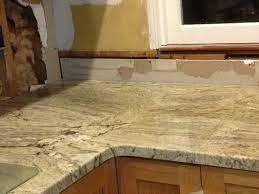
Is Onyx the Right Choice for Your Home?
Onyx is a truly enchanting natural stone with a long and fascinating history. Used throughout the ages for jewelry due to its exceptional properties when carved, this luxury stone is also quarried and sold as slabs for use as countertops, fireplace surrounds, vanities, and as a decorative showpiece that makes an impressive design statement.
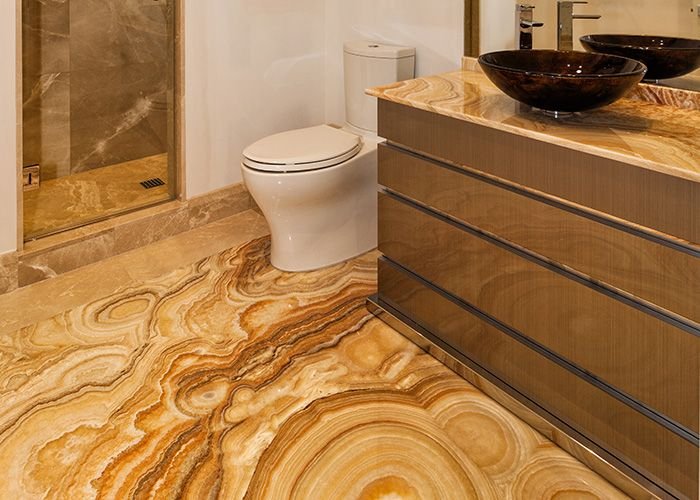
Onyx Countertops
As a rule, onyx is one of the most brittle and delicate natural stones you can install as a countertop. For this reason, it is recommended that you only use it as a countertop in an area of your home that does not see heavy use. Instead, onyx can shine as a custom bar countertop and is used by a lot of commercial bars as a wow factor to dazzle their patrons.
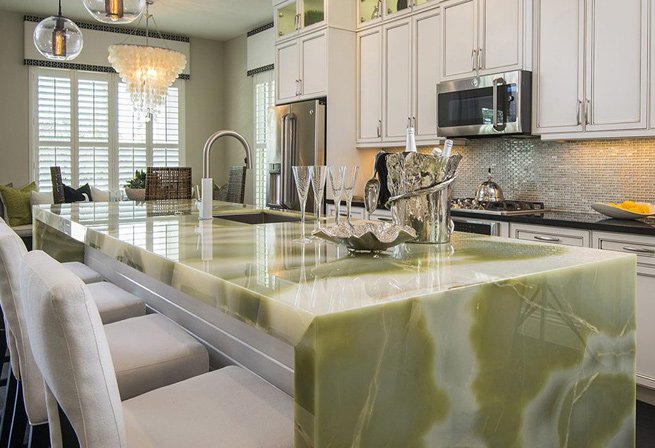
Marble Tiles
Marble always brings to mind luxury and prestige and if those are elements you wish to invoke in your interior design goals then it may be the stone for you. As a tile option, marble can really tie a room’s design together and is the perfect choice if you want to make your floor one of the main attractions in your home. Marble comes in a wide variety of colors and patterns and is incomparable when it comes to sheer aesthetic appeal and overall value. Although certainly one of the more expensive options, if properly maintained marble will most certainly raise the property value of your home over the long run.

Travertine Tiles
Travertine is a form of Limestone that is created near mineral spring deposits and comes in a variety of earth-tone hues. Its name is derived from the Italian word ‘travertine and in fact, Italy is renowned for its travertine production with some of the best quality slabs and tiles coming from that region of the world.

Granite Tiles
Granite makes for the most durable tiles of the bunch so if you are going to be installing tiles in an area of your home that sees heavy use, granite can get the job done. In addition to rock-solid durability, granite tiles are available in a variety of colors and patterns that can complement the other design elements in the room.
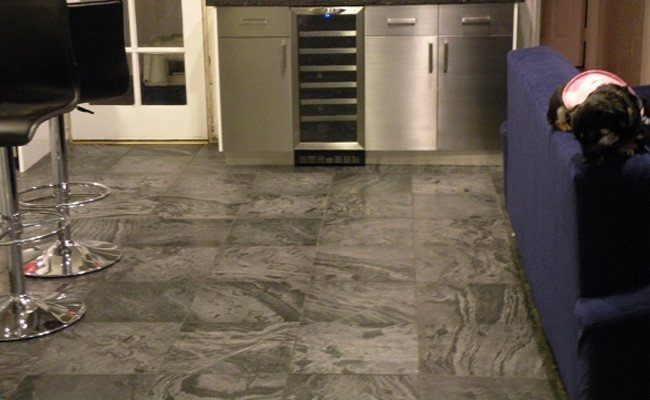
Carrara Marble
Carrara marble is characterized by a light grey background dominated by soft and feathery grey veins. The veining on Carrara marble tends to be thin, long, and linear, without much empty space on a typical slab. The veins are often not clearly defined and appear to blend into the surface of the stone, instead of standing out.
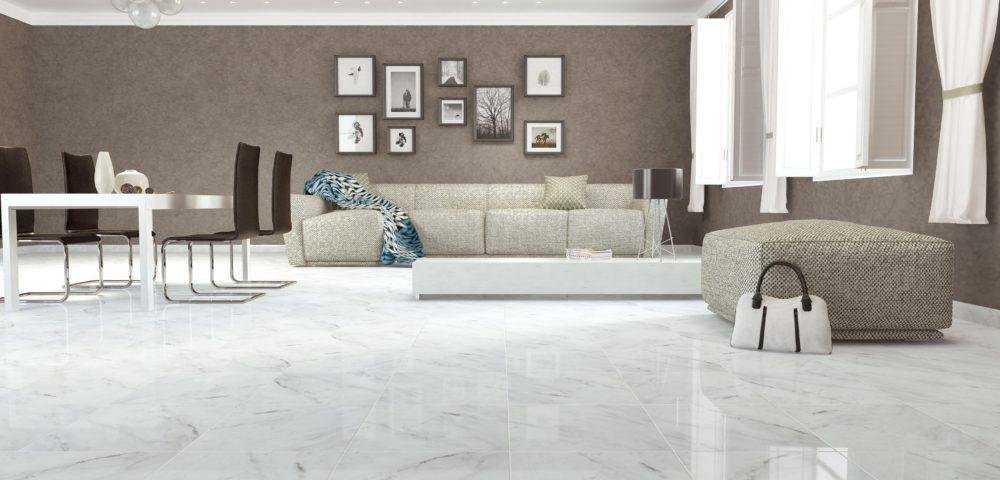
Calacatta Marble
Calacatta is characterized by a clear, white background and thicker, impactful veining that can be grey or gold/brown but is sometimes a combination of some or all of those colors. The veining here tends to be more distinctive than Carrara marble and less linear as well. The result is a stone that captures what many people believe to be the ideal marble look and the kind of patterning associated with marble luxury and prestige.
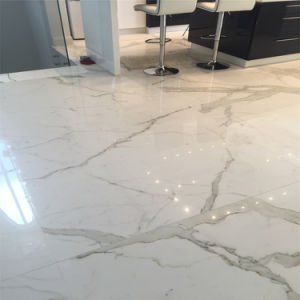
Best Practices for Maintaining Your Marble
Firstly, make sure that you apply a high-quality sealer to the surface of the stone to help prevent your marble from absorbing liquids and getting etched. There are many varieties of sealer on the market, make sure to go with an Impregnator Sealer, which absorbs into the stone and fills in microscopic holes to repel water and other liquids from seeping into it. Secondly, marble is particularly susceptible to citrus, tomato sauce, vinegar, and other acidic food substances. For this reason, you should make sure to use coasters, cutting boards, and anything else that makes sense to separate acidic liquids from potentially touching the stone. The same goes for oily materials such as cooking oil and dairy products, which can leave quite a deep stain if left unchecked.
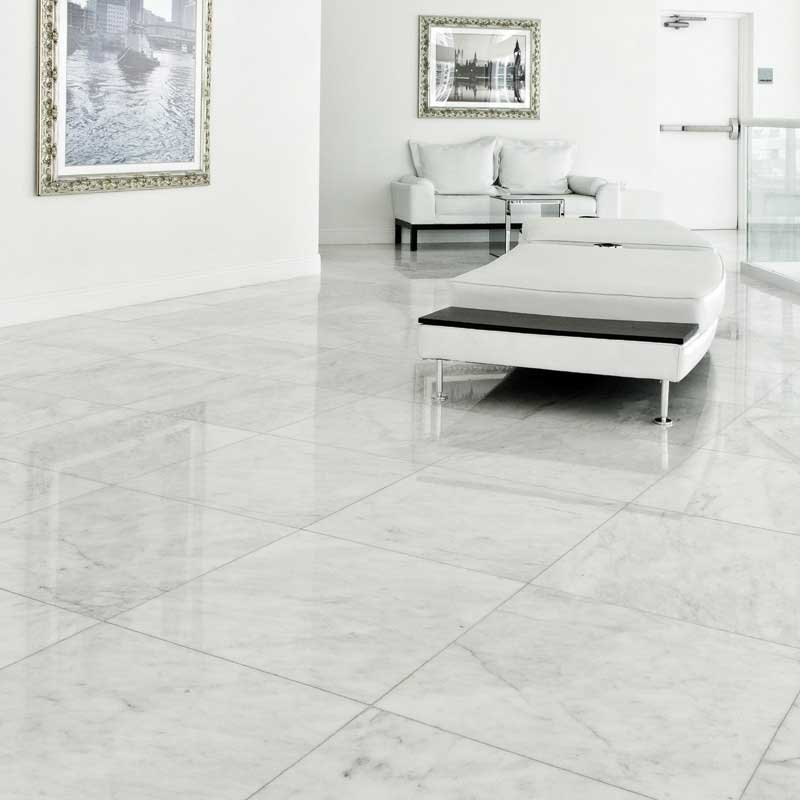
Should You Go with Marble Countertops?
With all that being said about changing your mindset around marble, you do have to honestly ask yourself if it is the right material for you. Although you shouldn’t be too concerned about the aging of the stone, there is still some care and maintenance required and some other factors to consider as well.

INDIA’S TOP AND WORLD’S BEST MARBLE, GRANITE AND STONE COMPANY
ADD BY EXPERT AND EXPORT TEAM OF BHANDARI MARBLE GROUP. CONTACT US ON; 9672941111



